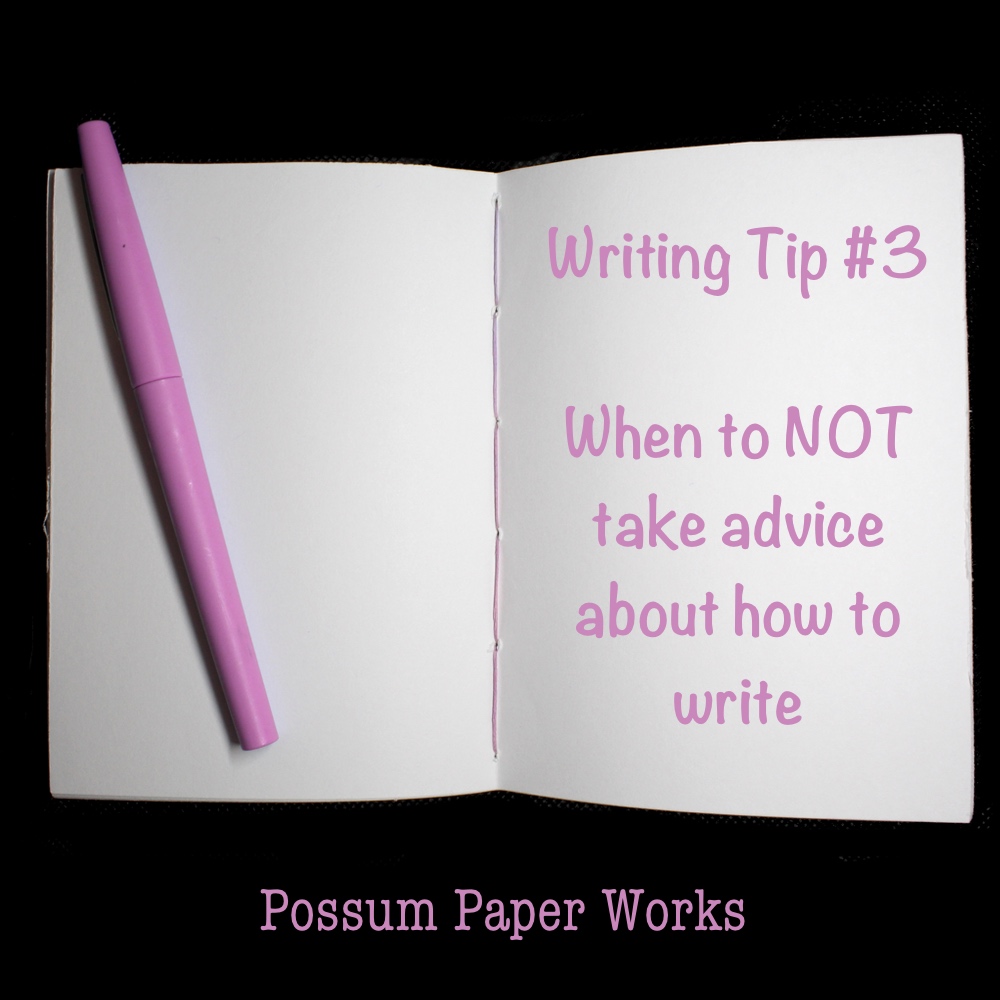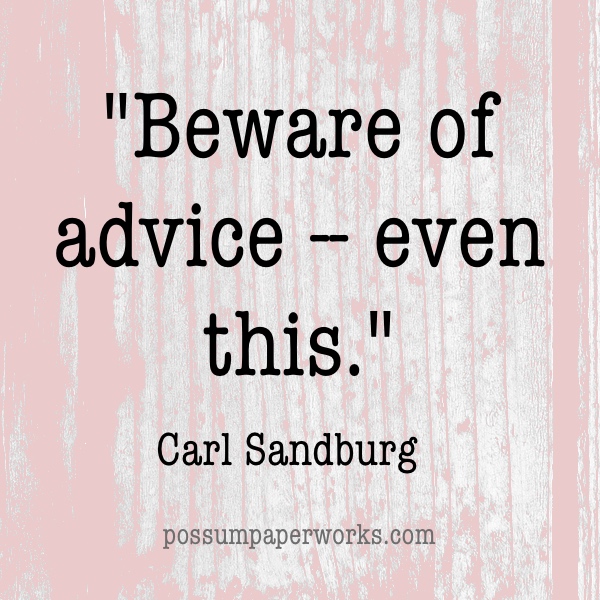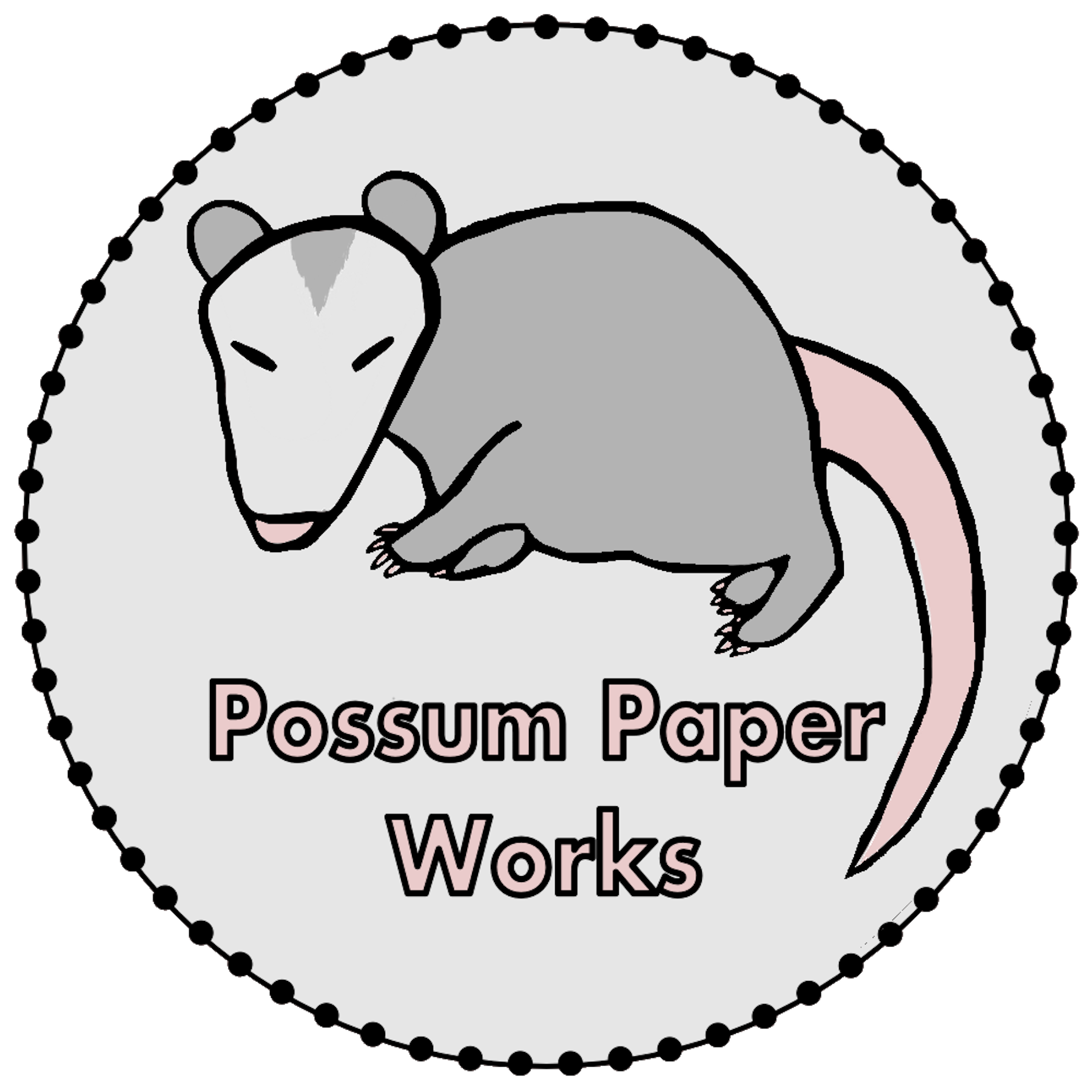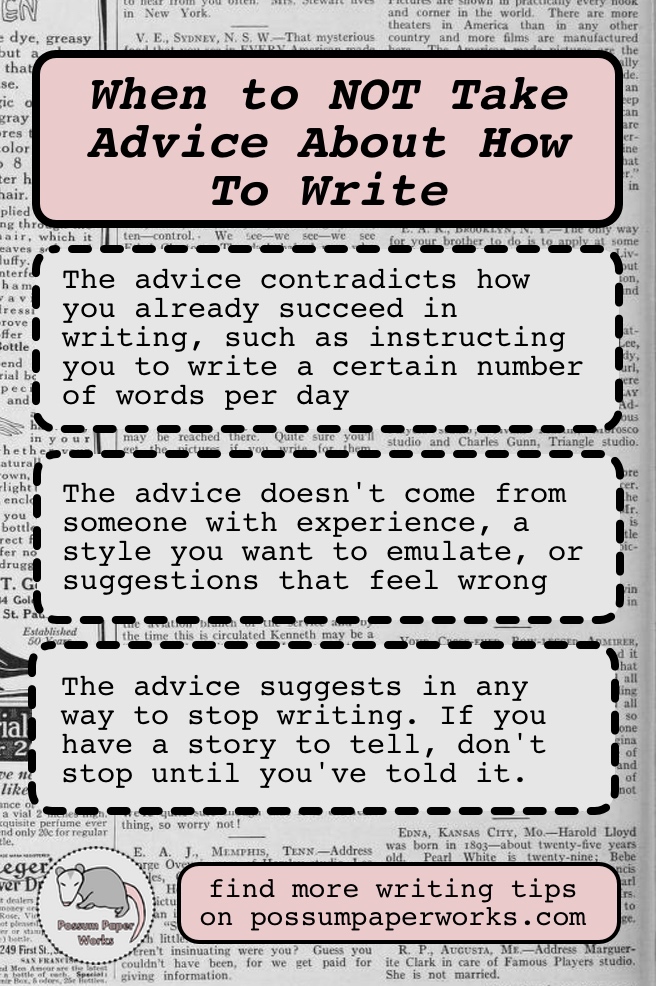
Welcome to the Possum Paper Works Writing Tip Rodeo! Today I’m looking at something very important – when to NOT take advice about how to write. Specifically, I’m acknowledging my own fallibility in running this rodeo.
Writing Tip #3 – When to Not Take Advice
A disclaimer I should have included about this series a while ago: I’m an amateur writer. I’m not published and I don’t have a degree in English. I cannot solve all of your writing issues, because I can’t always solve my own. I am human and thus imperfect. Nonetheless, I love writing, I love learning more about writing, and I love sharing what I do know.

Why I’m writing these tips
I believe that anyone who has a story to tell should have the tools to share that story. Every little bit of knowledge I’ve accumulated about writing has the potential to help you build your own toolkit.
I don’t expect to teach you everything you need to know about writing, and I’d hope you don’t expect me to. What I want you to get from my advice is exactly what the label reads: writing tips.
What I share are snippets of information I’ve learned to help you figure out how you write the best; how you can tell your own stories. I want to share what I can to help you improve. There’s no need for poorly-written stories to exist when good ones could take their place.
As Mr. Sandburg’s advice shows, even this week’s tip (and every tip of mine) should be taken with caution. Remember, I’m a proud amateur.
Ask yourself: does the advice work for you?
As I write this, I’m procrastinating on working on a different project. Recently I’ve been trying to write at least 500 words a day in one specific work. Many guides to writing suggest writing much more than that a day.
I’ve found that I often can’t. Between being a student, running a business, and the distractions of everyday life, 500 already can be a stretch. Some days I can write 1000 or more, but trying something like the 1700 daily words of NaNoWriMo? Forget it. I think I’ve done that once.
I share tips and tricks that have worked for me in some way. My previous tip about using music for inspiration might seem obvious to most creative people, but not everyone. After all, everyone finds inspiration in their own ways. That’s what makes our stories unique and interesting.
Keeping that in mind, you have to find the things that work for you. Not what worked for your favorite author or your best friend. For you and you alone.
Maybe you write best at three in the morning. I’m not awake then, much less writing. If you find a tip that tells you to write first thing when you wake up, that’s probably not advice you want to take.
Perhaps that seems like common sense to you. Again, though, I find it’s important to remind both myself and other writers that not everyone follows the same rules and that’s okay.
Feel free to experiment with rules and advice
Don’t pressure yourself to always follow the rules you’re given. If someone tells you that there’s only one way to write, acknowledge their point, and write a completely different way.
Play with how you write dialogue. James Joyce and David Mamet both did so to great effect. See how many adverbs you can cram into your sentences and then cut out every single one. Imitate the styles of Ernest Hemingway and Virginia Woolf both, at one time even.
Yeah, there are rules in writing. Some of them are there to help the readers make better sense of what you’re saying. It’s not a bad idea to learn those rules. But don’t feel obliged to follow any of them. Imagine how many classic works of literature and poetry would never have been written if the authors followed the established rules!
Consider who’s giving the advice
Are you getting tips from a professional writer or an amateur? Someone who writes for a living or for the story? A blog or a book?
Don’t think for a second any one of those sources is inherently better than another.
There are amateurs with better instincts than bestselling authors, with tips better for your style than any pro. If you’re writing something to sell it, the people who make a profit are likely to have more relevant tips than writers who write for the sake of the art. Books are just as likely to be filled with nonsense as a stranger on the internet, or with gold.
This is akin to any basic fact-checking procedure for research. Know the background of who you take advice from. Look them up on the internet beyond their own page. See if what they write is similar to what you want to, or if they themselves are similar.
If anything about the person or the suggestion doesn’t feel right for your style, personality, or even politics, consider rethinking the advice. That doesn’t mean you have to ignore the advice, but it does mean you don’t have to beat yourself up for not following everything they said to the letter.
Remember, you can always use advice in your own way. It’s your life and your writing.
Above all, don’t stop writing and learning.
No matter what people tell you about how to write, don’t stop writing. If someone’s advice is to not write, ignore that advice. If someone promises the end-all be-all guide to writing, take their tips, understand what you can, and learn more.
Writing is freedom. Creativity in any form gives you the ability to share the worlds and lives in your head and the things you love. The best advice is the kind that comes from that same place love, of sharing, of improving, and of learning.
Not all advice is equal. People can tell you whatever they want to. Just remember that only you can choose what knowledge you take to heart.
And never, ever, stop listening and learning.

